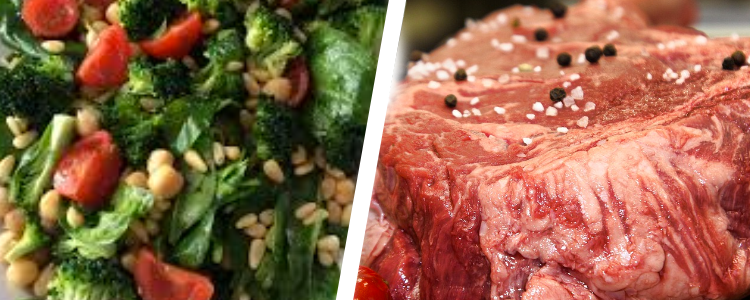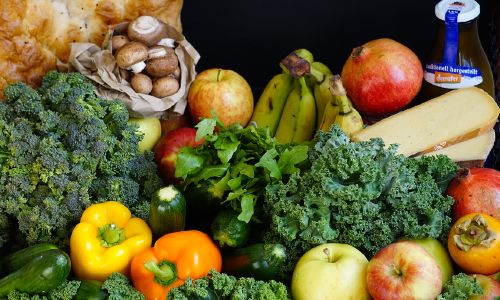Now, before you start writing your page long rant about which you agree with any, it’s a fact. People care about this topic. So instead of tackling the ethical debate here today, we’re just going to lay out some of the nutritional facts that come with the topic and we’re going to let you make up your own minds.
In the same way that some vegans believe meat causes cancer and destroys the planet. Meat-eaters often argue that giving up animal foods leads to nutritional deficiencies.

Let’s start with Veganism & Vegetarianism.
Many people assume that one of the big benefits of plant-only diets is this: They reduce risk for disease. And a number of studies support this.
For example, a recent study showed that fully plant-based eaters scored highest on the Healthy Eating Index (which is a measure of dietary quality). Omnivores and meat eaters however, scored lowest on the Healthy Eating Index and the other groups such as pescatarians scored somewhere in between.
Meat eaters were also more likely than other groups to be overweight or obese.
But is this ALL down to the fact these people did not eat animal products? NO.
Why?
Anyone who eats a healthy balanced diet (whether it includes meat or not) is likely to hold a higher dietary quality than someone who doesn’t. In an ideal world, all of our diets would all contain:
- Minimally-processed whole foods
- Fruits and vegetables
- Protein-rich foods (from plants or animals)
- Whole grains, beans and legumes, and/or starchy tubers (for people who eat starchy carbs)
- nuts, seeds, avocados, extra virgin olive oil, and other healthy fats (for people who eat added fats)
Which of those food groups do you think most people skip out on? Bingo, Fruits & Vegetables.

Fully plant-based eaters score higher on the Healthy Eating Index not because they don’t eat meats, but rather because they are far more likely to eat more minimally-processed whole plant foods such as vegetables, fruits, beans, nuts, and seeds.
The reason why meat eaters however score so low on this index is because they are more prone to diet loaded with processed foods which are completely stripped of whole, plant foods. Essentially, the meat is NOT the problem, it’s the bits surrounding it which leave your diet without any nutritional value.
Likewise, it is not the term ‘meat’ that causes cancer or leaves you prone to diseases. It is the processed meats such as ham, canned meats and low quality chickens etc which can be problematic for some people and leave your body open to more carcinogenic chemicals.
A TONNE of other factors play into your risk of diseases, other lifestyle habits—such as exercise, sleep, and stress—as well as other foods you consume all play a huge part.
What the study also showed is that of all of the dietary categories, veganism was the WORST for deficiencies such as calcium and protein. In the exact same way as the meat eaters, this is not because a vegan diet can’t contain these things, but because the individual’s surrounding foods and lifestyles may not support it.

What about the environment?
Another great argument for the vegan community comes around the environmental impact of meats and it’s true, cattle farming does cause around 70% of the world’s green house gases while all plants combined contribute to just 4 percent.
So how can you be conscious of this without giving up meat entirely?
1) Consider capping your consumption at 1 to 3 ounces of meat or poultry a day.
For most people, this one strategy will reduce meat intake by more than half. Replacing meat with legumes, tubers (such as potatoes), roots, whole grains, mushrooms, bivalves (such as oysters), and seeds offers the most environmental benefit for your buck.
2) Choose sustainably raised meat, if possible.
Feedlot animals are often fed corn and soy, which are generally grown as heavily-fertilized monocrops. (Monocropping uses the same crop on the same soil, year after year).
3) Purchase locally grown foods:
This one applies to the vegan community too. In addition to reducing transportation miles, local crops tend to also be smaller and more diversified. Veggies grown in soil also produce fewer emissions than veggies grown in greenhouses that use artificial lights and heating sources.
So who is right?
Everyone and no one. That’s right, your preference on meat and veganism might be more closely akin to your own ethical standings and that is completely fine. But the science shows that any eating pattern can be healthy or unhealthy.
Vegetarian and carnivore diets only indicate what people eliminate - and not what people include.
Whether someone is on the carnivore diet, the keto diet, the Mediterranean diet, or a fully plant-based diet, the pillars of good health remain the same and only by getting a balanced, varied and whole food diet will you be excelling your health towards excellence.







